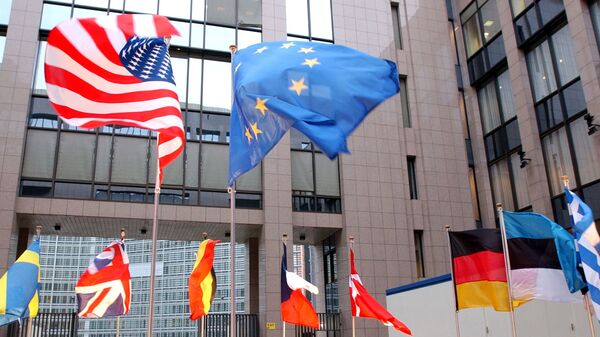The EU is preparing “an aggressive” trade scenario to counter the protectionist policies pursued by US President Donald Trump, according to a plan obtained by Politico. Brussels has not commented on the matter yet.
In the 173-page document, European Commission officials also urge the commission’s president-elect Ursula von der Leyen to create a fund that would invest $100 billion in “high-potential” European companies.
The goal is to compete with American and Chinese firms, which currently dominate the global tech market, according to the plan.
“Europe has no such companies,” the document reportedly says, referring, in particular, to the Chinese tech giants Baidu and Tencent and calling for these companies to be blocked from providing services to European businesses.
“The emergence and leadership of private non-EU competitors, with unprecedented financial means, has the potential to obliterate the existing innovation dynamics and industrial position of EU industry,” the document points out.
The EU plan also stipulates unilaterally imposing tariffs on US goods in response to the Trump administration’s potential progress in undermining the World Trade Organisation (WTO).
EU Hammers Out Response to US Tariff Spree
In May 2019, Trump vowed that Washington would slap tariffs on specific imported vehicles and parts which he claimed pose a threat to the country's "national security".
With the new measure temporarily suspended, Brussels has worked out a counter-plan to grapple with potential US tariffs on EU cars which stipulates the imposition of extra duties of up to 35 billion euros ($39.1 billion) worth of US goods.
“We will not accept any managed trade, quotas or voluntary export restraints and, if there were to be tariffs, we would have a rebalancing list,” European Trade Commissioner Cecilia Malmstrom said, voicing hope that the EU does not have to resort to this.
Trump Slams WTO as ‘Broken’ Organisation
Late last month, Trump expressed dissatisfaction with Beijing's "developing country" status in the WTO, tweeting that the organisation is “broken when the world’s richest countries claim to be developing countries to avoid WTO rules and get special treatment”.
The US President ordered his Trade Representative to stop treating large emerging economies as "developing" in case the WTO does not initiate reforms with regard to these countries' "unfair advantages" within the next 90 days.
Last year, US Secretary of the Treasury Steven Mnuchin rebuffed allegations that Trump wants to withdraw from the WTO under the pretext that American membership in it is ostensibly harmful for the country.
Trump publicly criticised the WTO during his 2016 presidential campaign, branding the organisation a "disaster".
He imposed 25-percent and 10-percent tariffs on steel and aluminium, respectively, coming from China, Canada, the European Union and other countries in 2018, blaming them for "unfair" trade with the US and the country's "bad" trade deficit.
The countries responded in kind by slapping retaliatory tariffs against several categories of American goods and lodging several complaints with the WTO's court sysem. Trump has urged these countries to set zero tariffs on all US goods instead, promising to lift US import taxes on steel and aluminium in return.
Professor Reveals How EU May ‘Regain Ground in International System’
Fabio Massimo Parenti, an associate professor of economic and political geography at the Lorenzo de'Medici Italian International Institute in Florence, Italy, has meanwhile suggested that the EU may pick “some trade countermeasures” in the current situation” but that “it will need longer time than US and China to compete on technological field”.
According to him, regaining ground in the international system may be resolved by the EU through at least three steps.
“Firstly, reforming itself, overcoming neoliberal paradigm, coordinating expansionary fiscal policies and reestablishing the primacy of welfare state experience. Secondly, building geopolitical autonomy from the US-NATO system; thirdly, launching new platforms of cooperation with the East and the West, namely, with China-Russia and the US”, Parenti argued.


